 Leading Blog | Posts by Month |
 Leading Blog | Posts by Month |
09.28.07

Being a Role Model: Who's Watching You?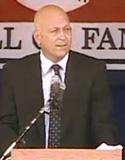 We all hear about how baseball imitates life, which held especially true for my dad. He used to say that everything that happens in baseball happens in life and everything that happens in life happens in baseball. He certainly taught us about life through baseball. But I also have to admit that as a young man with a limited view of the world, baseball and life became one for me and it was difficult to see beyond playing the game. Did you ever stop to think about how your life would unfold or imagine how you would like your life to turn out? One of those reflective pauses happened in my life when I was around 18 years old. I thought I had it all figured out, I would play big league baseball until about 45 and then worry about the rest of my life after that. It took me a little while, but I did come to realize that baseball was just one part of my life with the possible exception of this weekend, of course. This was never more clear to me than when we had children. I realized that the secret of life is life, and a bigger picture came into focus. Games were and are important, but people and how you impact on them are most important. While we all work to develop into productive people for our own happiness, it is also vital that we do so for the good of society as a whole. As I came to know the importance of my role in the development of my children, I began to sense the impact I could have on other kids. It is all about coming to the realization that we all have within us the power to develop and pursue almost anything we set our mind to, and that is the message and opportunity we want to pass to all children. We are the ambassadors for the future, just as a baseball player wants to leave his mark on the game and leave it a little better than he found it, we should all try to make this world a better place for the next generation. When I realized that I could use baseball to help make life better especially for the kids, baseball became a platform. By trying to set a good example, I could help influence young people in positive and productive ways. And some of this became apparent to me in my earliest playing days. So as my major league career unfolded, I started playing a little more attention to my actions. I remember when Kenny Singleton showed me a tape of me throwing my helmet down after a strikeout and all he said was, "How does that look?" I remember learning about a family who saved their money to come to Baltimore to see me play. I got thrown out in the first inning and their little boy cried the whole game. I remember how I reacted with anger when dad was fired after an O-and-six start, and after each of those events and others, I vowed to act better the next time. Yes, these were only little things, but as dad used to say, if you take care of all the little things, you'll never have a big thing to worry about. As the years passed, it became clear to me that kids see it all, and it's not just some of your actions that influence, it's all of them. Whether we like it or not as big leaguers, we are role models. The only question is will we be positive or will it be negative. Should we put players up on a pedestal and require them to take responsibility? No. But we should encourage them to use their influence positively, to help build up and develop the young people who follow the game. Sport can play a big role in teaching values and principles. It can be a huge developmental tool for life. Just think—teamwork, leadership, work ethic and trust are all part of the game and are also all factors in how we make the most of our lives. So an essential part of the job of every player and of all people for that matter is to help the young people of today learn these lessons so they can live better lives tomorrow.
Posted by Michael McKinney at 12:30 PM
09.26.07

Lord Sharman on Helping People GrowLeading By Example is a concise little book of interviews with top leaders from various fields. Each interview in this new Harvard Business School series is followed by a list of takeaways. Here is an excerpt by Lord Sharman, chairman of the Aegis Group, on investing in people by understanding their strengths and nurturing them like a gardener with prized plants.I’m very fond of gardening myself, and I’m fond of gardening examples. To some degree, developing people in an organization is impossible. You can’t develop them; they develop themselves, and so your job is like that of a head gardener. You figure out what the various microclimates are around the place, and then you figure out the qualities of the plants that you need to go into those microclimates. Similarly, you select the people based on their strengths and place them in those jobs. I’ve seen notes of appraisal interviews, which say that two-thirds of the interview is spent talking about what the guy’s not good at. Now, that’s great—I can’t imagine anybody coming out of an interview like that feeling anything other than very depressed.
Posted by Michael McKinney at 09:15 PM
09.24.07

Lessons from the Prophet Jonah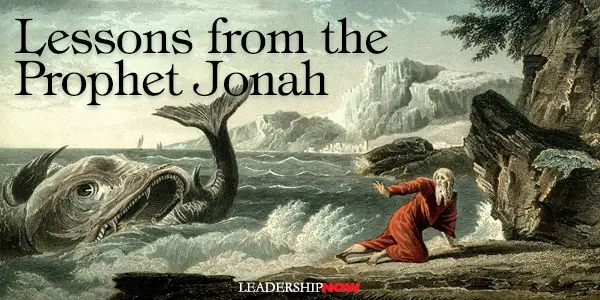
TWO DAYS AGO, on Yom Kippur — a day about braking wickedness — at synagogues around the world, a book about breaking wickedness — the book of Jonah — is read. In the Jerusalem Post, the dean of the Schechter Rabbinical Seminary, Einat Ramon draws a perspective on leadership and responsibility from the book of Jonah that I had not read before. He writes:
Trivia: Jonah was told to go to Nineveh. Nineveh today lies across the Tigris River from the modern Iraqi town of Mosul.
Posted by Michael McKinney at 08:42 AM
09.22.07

There's Servant Leadership and Then There's... From The Philippine Star comes this old joke:  One day as 10 slaves were rowing a boat, the strain of every stroke showing on their faces, the first mate appeared on the deck. “I’ve got good news and bad news,” he said. One day as 10 slaves were rowing a boat, the strain of every stroke showing on their faces, the first mate appeared on the deck. “I’ve got good news and bad news,” he said.
“The good news is we see an island so we’re going to stop, drink rum, hunt a couple wild boars and have a feast.” The slaves whispered in happiness, all but one, who asked “what is the bad news? “Well,” the first mate replied, “tomorrow the captain wants to go waterskiing!”
Posted by Michael McKinney at 10:59 PM
09.21.07

The Need for Reflection
We need organizational greatness, but we can’t wait for the single leader to build, rally, and command an organization. We need leadership distributed throughout our organizations. Steep hierarchies have given way to flat, distributed organizations. Furthermore, we need these distributed leaders to possess an understanding of the organization’s goals and to have the skills to move their part of the organization toward those goals in this environment of speed and change. We need leaders who can move their organization in an agile fashion within the bigger picture and toward the bigger goals. We need leaders who know their strengths and weaknesses and can work with others who supplement those strengths and offset those weaknesses. This kind of deep learning and self-strategic awareness cannot exist without the skill of reflecting. We reflect in order to learn from past successes and failures, weigh options for our future against some underlying principles that rarely change, and use this knowledge for the betterment of our organization in the future. We use reflection to understand why things happened or could happen the way they do. And we use reflection to build and adhere to our integrity as leaders and organizations. We often think of the skill of reflecting as being applied only after we act. Reflecting backward is important and draws on the anchoring concepts of metacognition (thinking about how we think), self-regulation, and making implicit knowledge explicit. However, if what you want to develop is a Prepared Mind, it is good to develop the skill for reflecting forward as well. This requires the use of foresight as well as hindsight. Reflecting forward incorporated the skill of imagining and requires us to dig a little more deeply into our tacit and implicit knowledge before we act. This may delay action for just a little while, but it can often save us from unwise action and negative unintended consequences, help us see risk and opportunities in the situation we did not see before. If we are open to being self-critical using our skill of metacognition, we can also detect our own biases and blind spots in what we know and how we process information, so we can call on other perspectives before taking action. Adapted from The Prepared Mind of a Leader by Bill Welter and Jean Egmon.
Posted by Michael McKinney at 09:03 AM
09.19.07

Make it Great! Make It Great! means it's my choice, which means it's your choice too. Whether you actually have a good day is not the important thing; what's important is how you choose to deal with the things that each day brings. Each encounter presents you with an opportunity to either let it pass by, or tackle it head on and truly Make It Great! Phil makes an important point. It's relatively easy to have a great day when things are going your way. The discipline comes in when things aren’t going our way. It’s easy to use circumstances as an excuse as to why you couldn’t do what you know is right—“Don’t make me mad!” “I would have but they ….” The ball is always in your court. You can find Phil over at Make It Great! 
Posted by Michael McKinney at 07:06 AM
09.16.07

Alan Greenspan: The Age of TurbulenceAlan Greenspan begins The Age of Turbulence on the morning of September 11th, 2007, but then leaps back to his childhood, and follows the arc of his remarkable life’s journey through to his more than 18-year tenure as Chairman of the Federal Reserve Board, from 1987 to 2006, during a time of irrational exuberance. It’s a good read, written in clear language on the workings of the economic world (and then some). Here are some of the informed opinions he presents in the book:“For the five years we overlapped, President Bush honored his commitment to the autonomy of the Fed….The administration also took the Fed’s advice on policies we thought were essential for the health of the financial markets. Most important was the effort that began in 2003 to curb excesses at Fannie Mae and Freddie Mac….President Bush had very little to gain politically by supporting a crackdown. Yet he backed the Fed through a two-year struggle that resulted in crucial reforms. My biggest frustration remained the president’s unwillingness to wield his veto against out-of-control spending.” “After the Republicans lost control of Congress in the November 2006 election, former House Republican majority leader Dick Armey published a perceptive op-ed piece in the Wall Street Journal….Armey had it exactly right. The Republicans in Congress lost their way. They swapped principle for power. They ended up with neither. They deserved to lose.” “[Wealth Creation] requires people to take risks. We can’t be sure our actions to acquire food, clothing, and shelter, for example, will succeed. But the greater our trust in the people with whom we trade, the greater the accumulation of wealth.…Reputation and the trust it fosters have always appeared to me to be core required attributes of market capitalism. Laws at best can prescribe only a small fraction of the day-to-day activities in the marketplace. When trust is lost, a nation’s ability to transact business is palpably undermined. In the marketplace, uncertainties created by not always truthful counterparties raise credit risk and thereby increase real interest rates.” Looking toward the U.S. economic future, a 4 to 5 percent inflation rate “is probably not a bad first approximation of what we will face.” He continues, “Yet to keep the inflation rate down to a gold standard level of under 1 percent, or even a less draconian 1 to 2 percent range, the Fed, given my scenario, would have to constrain monetary expansion so drastically that it could temporarily drive up interest rates into the double-digit range not seen since the days of Paul Volker.“ “A simple test for any retirement system is whether it can assure the availability of promised real resources to retirees without overly burdening the working-age population. By that measure, America may be on a collision course with reality….[W]e likely won’t have enough people working, nor will we likely have a sufficient increase in the amount each worker in average can produce, to cover the enormous shortfall from entitlements under current law. It may not even come close.” “The notion of enlisting representatives of a corporation’s various stakeholders on the board—unions, community representatives, customers, suppliers, and so forth—has a nice democratic ring to it. But it is ill-advised and I strongly suspect it will not work. Today’s highly competitive world needs each corporation to execute plans from a single coach, as it were. A vote by the whole team on each big play is a recipe for defeat. I assume that eventually some of the more abrasive edges of Sarbanes-Oxley, especially Section 404, will be honed down.” "The shift of manufacturing jobs in steel, autos and textiles, for example, to their more modern equivalents in computers, telecommunications and information technology is a plus, not a minus, to the American standard of living," “However we get to 2030, the U.S. economy should end up much larger, absent unexpectedly long crises—three-fourths larger in real terms than that in which we operate today.” “We should focus on addressing and assuaging the fears induced by the dark side of creative destruction rather than imposing limits on the economic edifice on which worldwide prosperity depends.” “Venice, I realized, is the antithesis of creative destruction. It exists to conserve and appreciate the past, not create a future. But that, I realized, is exactly the point. The city caters to a deep human need for stability and permanence as well as beauty and romance. Venice’s popularity represents one pole of a conflict in human nature: the struggle between the desire to increase material well-being and the desire to ward off change and its attendant stress.”
Posted by Michael McKinney at 08:08 AM
09.14.07

Taking It Personally“Foolish is the person that takes offense when none was intended. More foolish is the person that takes offense when it was intended.”The above statement rings true, because either way we lose. In egonomics, David Marcum and Steven Smith describe the difficulties that arise when we get our identity confused with the topic being debated—when we take things personally. When we get into a vigorous debate, it’s quite common to find that we respond to a perceived attack with behavior that indicates our ego is in trouble. When we respond to a statement or question by comparing ourselves, seeking acceptance, showcasing or getting defensive, it often means that we think our identity is under attack. In other words, we forget about the debate of ideas and respond as though who we are is being threatened and we take it personally. It’s not unusual that we have a tough time separating our ideas from our identity? Trial attorney Gerry Spence explains, “We all have a personal image that he must protect. For example, I do not want to be seen by others, and particularly my myself, as weak, as ill advised, as less than worthy, as stupid, as someone who cannot be respected. I will do whatever is necessary to preserve my personal image of myself. The more fragile my self image, the harder I will struggle to preserve it.” Marcum and Smith explain it this way: “If we can’t distinguish who we are from what we do, what we have, or who we do it with, we won’t see past our titles or tenure in a discussion. If we say to ourselves or others, ‘I’m the Vice President,’ ‘I’m the CEO,’ ‘I’m the Director of Public Relations,’ or even ‘I’m the creative one’ or ‘I’m the advocate for diversity here,’ then we’re parading our identity, and take it personally.” In egonomics, Marcum and Smith examine an exchange between Fred Rogers and Senator John Pastore at a Congressional hearing to effectively explain this point. It clearly showcases the benefits of maintaining a separation between identity and ideas and keeping your ego in check with humility. They explain, “In the intensity of debate, humility is like a two-way surge protector; it keeps us from making it personal or taking it personally.” Of course, the trick is to avoid this negative response cycle in the first place. The authors borrowed an idea from Carl Rogers to give form to an essential attitude to take when faced with a vigorous debate (or when dealing with people in general). The idea is to treat people with unconditional positive regard. That is to say that “everyone is worthy of respect and capable of contribution, even when they don’t particularly act that way or even feel that way about themselves.” We want to assure others that we aren’t trying to change who they are, but we are interested in presenting another viewpoint. If you find yourself in a situation where things have gotten beyond productive, then the author’s suggest using one of the following opening statements before we begin asking questions: “You might be right…” “Even though that’s hard to hear, I’m glad you’re saying something…” “Okay. Let’s talk that one through.” “Say a little more about that.” It doesn’t signal agreement, it expresses a mind open to understanding. Debate needs to follow understanding or people often begin to defend themselves and not their ideas. Finally, in the spirit of vigorous debate and deepened understanding, humility prompts us to ask, “Who cares if I’m right at this instant if we get it right eventually?” If we’re devoted to progress, it doesn’t matter who has the answer, but that the answers are found.In the balance of the book, Marcum and Smith show that shifting conversations from statements and judgments to exploration requires not just humility, but the relentless application of two more principles—curiosity and veracity. They maintain a good blog that is worth checking out also.
Posted by Michael McKinney at 12:33 AM
09.12.07

My Life Feels Like a Three-Ring Circus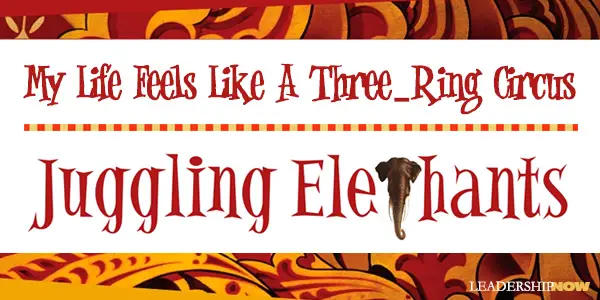
HERE'S a book for organizations and individuals that struggle with “getting it all done.” That is to say, nearly all of us. Authors Jones Loflin and Todd Musig have put together a memorable and fast-paced story in Juggling Elephants. By bringing out principles designed to help you juggle the acts in your life, and demonstrating through examples, practical tools being applied in the life of the main character, Mark, this book delivers. Here are several of the principles in brief:

Posted by Michael McKinney at 08:47 AM
09.10.07

Four Warning Signs That Our Ego is Getting the Best Of UsA managed ego is an important trait of the effective person. Authors David Marcum and Steven Smith state in their compelling book egonomics: What Makes Ego Our Greatest Asset (or Most Expensive Liability), that “surprising as it may sound, many people don’t have enough ego, and that leads to insecurity and apathy that paralyze cultures and leaders.” This is an important addition to our thinking about ego and worth examining in more depth. It does sound odd as no doubt, most of us have been told that ego is a bad thing. But an unbalanced ego—either overconfident or lacking in confidence—can trap people in bad thinking resulting in poor or damaging interactions with others.egonomics offers four warning signs that our ego is getting the best of us:
Humility isn’t the opposite of ego, but it plays a vital role in keeping it in balance. Marcum and Smith created the following diagram to help us to understand the equilibrium concept of humility.  The diagram graphically illustrates the two poles of ego and the grounding effect that humility plays to pull us back into a proper perspective. The authors define humility as the “intelligent self respect which keeps us from thinking too highly or too little of ourselves. It reminds us how far we have come while at the same time helping us see how far short we are of what we can be.” Ego doesn’t suddenly pull us to the extremes and twist us overnight into egomaniacs, or lead us to believe we’re above the law. But once we’re in the habit of being off-center, we do slowly start to believe we’re above other things: reproach, being wrong, being questioned, the need to prove we’re right, having a bad idea, following the lead of others, and so on. Being consistently off-center leads us gradually toward the extremes.When we lose control of ego, we lose “trust, respect, relationships, influence, talent, careers, clients, and market share. Each of us has occasionally, perhaps unknowingly, let ego weaken our talents despite our qualifications, expertise, charisma, track record, or remarkable ability.” This is an important book that will be helpful to anyone trying to get a handle on their ego and understand it manifestations in themselves and others. egonomics is a book that every leader should read and one that we will return to again on this blog.
Posted by Michael McKinney at 12:32 AM
09.07.07

Be Not a Scholar Confused By Your Own Learning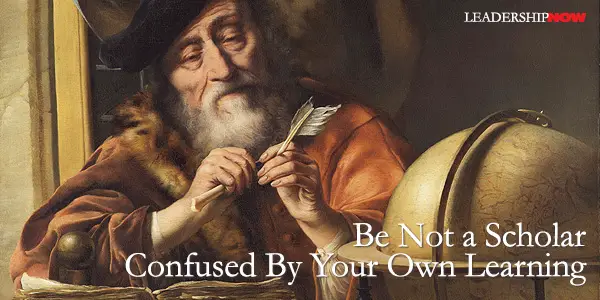
AS ONE studies leadership, I am reminded of Louis Nizer’s words to be “a scholar who is not confused by his own learning.” It’s easy to get caught up in some of the theory, jargon and formulas and find the whole thing inaccessible but to the best minds. Don’t get me wrong, I believe that the books, training, and mentoring are essential to opening our minds to think in new ways. But ultimately, leadership development begins with self-knowledge and the development of a disciplined mind and character. It is specific to our varied own backgrounds and situations. There are hundreds of great tools to help you get there, but the only one that can begin the journey, is you. The late great diplomat, Abba Eban once wrote, “An ‘expert’ is a man who understands everything—but nothing else. He sometimes becomes immune to the intangible but powerful human impulses that lie beneath the surface of his discipline.” Yet, it is in the “intangible but powerful human impulses that lie beneath the surface” where you will find leadership. Fortunately, that is accessible to everyone who makes the effort. 
Posted by Michael McKinney at 11:07 AM
09.05.07

Empower Yourself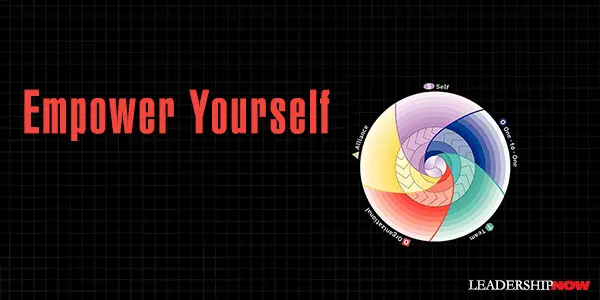
IN a very practical book, Achieve Leadership Genius, authors Drea Zigarmi, Susan Fowler and Dick Lyles ask, “What if employees didn’t wait to be empowered—but empowered themselves?” Good question, one that places the responsibility for “empowerment” where it belongs. The individual. If you’re waiting for your boss to give up control and decision-making authority to turn you into a free-thinking, free-wheeling employee empowered to determine your own work rules, you’ll wait a long time. Empowerment is a good idea, but as the authors point out, it depends on self-leadership—“people who possess the ability, energy, and determination to accept responsibility for success in their work-related role.” Employee engagement suffers because organizations depend on managers to engage employees rather than developing self-leaders who recognize their responsibility and have the skill to take the initiative for success in their role. The road to empowerment begins with visualizing your ideal role. That vision is something you can begin to build your identity around. How do you see yourself? How do you want others to see you? Your identity will guide your thoughts, decisions, and actions. Keep in mind your vision should be aligned with the goals and purposes of your boss and organization, or you will get no support. The authors remind us to “Consider your role as a piece of the puzzle—one of many in an organization. It is important for you to understand the big picture and your place within it. Your efforts to envision will not only help you understand the meaning of your work, but it will also remind your boss of the vital contributions being made by you and your role.” Wise sages extol the virtue in the moment. But what happens when the challenge of the moment diminishes the energy available for moving forward? Your work-related vision acts like an emotional manager to pull you through the tough times and into a time of possibility. It provides a transition from the potentially threatening current reality to the next step of action. It empowers you to overcome the inevitable obstacles, pain, strife, exhaustion, and any number of inevitable de-motivators that could jeopardize success in your work-related role. 
Posted by Michael McKinney at 10:20 AM
09.04.07

Newswire: Gimmicky Leadership
Posted by Michael McKinney at 04:35 AM
09.03.07

Why Aren’t We Learning?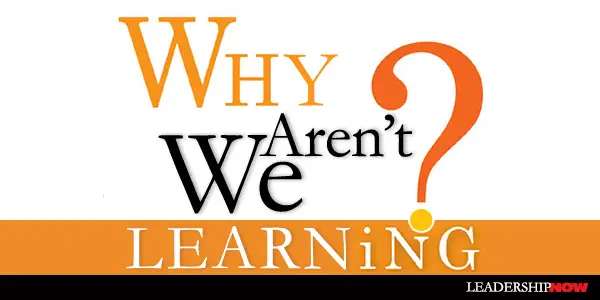 JEFFREY PFEFFER observes in What Were They Thinking? that while “learning organization” and “continuous improvement” have become cliché, few companies actually do those things that need to be done to make them smarter. He writes, “That’s because some of the things they need to do to learn are counterintuitive.” And we might add, are frowned upon socially. We would rather say, “We rarely (never) make mistakes,” instead of “We make mistakes, but we’re learning.” The latter just doesn’t have that ring to it. Culturally, mistakes have no glamour to them. To be free of them is everything. We are attracted to the person who seems to be on top of it all. The fact is, we all make mistakes. But are we learning?
JEFFREY PFEFFER observes in What Were They Thinking? that while “learning organization” and “continuous improvement” have become cliché, few companies actually do those things that need to be done to make them smarter. He writes, “That’s because some of the things they need to do to learn are counterintuitive.” And we might add, are frowned upon socially. We would rather say, “We rarely (never) make mistakes,” instead of “We make mistakes, but we’re learning.” The latter just doesn’t have that ring to it. Culturally, mistakes have no glamour to them. To be free of them is everything. We are attracted to the person who seems to be on top of it all. The fact is, we all make mistakes. But are we learning?
It may seem counterintuitive, but the most successful people are making many if not more mistakes than most people. The difference is that they don’t try to cover them up. They acknowledge them, learn from them and move on. At IDEO, they believe that it’s better to make many smaller mistakes than one big one. Pfeffer writes, “But that ethos requires accepting that novelty and innovation are invariably accompanied by setbacks and failures. And embracing such a way of operating requires letting people fail—maybe even encouraging them to fail. After all, if nothing ever goes wrong, it must be because the capabilities of the system and its people have not been truly tested.” This applies on a personal level as well. Are you testing your capabilities? Pfeffer proposes that organizational learning requires three things: 1. A clear understanding of reoccurring problems. “If the root causes of problems are not discovered and remedied, the problems will almost certainly recur . . . . Organizational learning thus requires people to direct others’ attention to problems so they can be noticed, diagnosed, and fundamentally fixed once and for all.” 2. The willingness to allocate resources to address the root causes of those problems. Research on health care organizations “found that those that learned best generally had a higher proportion of managers. . . . They were helping their employees learn, moving information across organizational boundaries, and essentially scanning the environment for common trends and themes, and then bringing that information to their people, who could collectively use it to enhance performance.” 3. Cultural values that foster learning—which means “encouraging employees to find, fix, and report mistakes rather than heroically patch things up.” Fundamental to this issue, is that we—businesses, churches, families, friendships—all too often punish (exclude, at least frown upon) those making mistakes and reward (promote, speak well of, hang-out with) those who don’t seem to be making any. Who would dare try to learn in that environment? Who would ask for help? 
Posted by Michael McKinney at 10:54 AM
09.02.07

Leadership Books: September 2007Here's a look at some of the best leadership books to be released in September.




Posted by Michael McKinney at 01:27 PM
|
BUILD YOUR KNOWLEDGE


How to Do Your Start-Up Right STRAIGHT TALK FOR START-UPS 
Grow Your Leadership Skills NEW AND UPCOMING LEADERSHIP BOOKS 
Leadership Minute BITE-SIZE CONCEPTS YOU CAN CHEW ON 
Classic Leadership Books BOOKS TO READ BEFORE YOU LEAD |
|